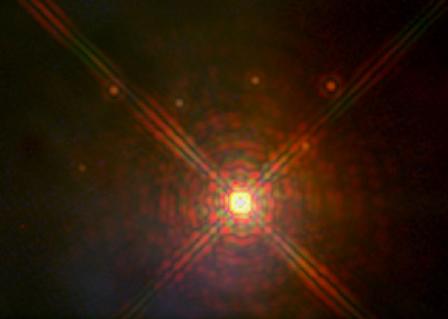Credit & Copyright: R. Thompson, M. Rieke and G. Schneider
(Univ. Arizona),
NASA
Explanation:
The star cataloged as NGC2264 IRS is normally
hidden from the inquiring gaze of optical
telescopes.
It resides in the midst of the
obscuring gas and dust
of a nearby star forming region
popularly known as the Cone Nebula.
Imaged in penetrating infrared light by
the Hubble Space Telescope's
NICMOS instrument,
this young and massive star
was found to be surrounded by six "baby" sun-like stars -
all within less than a tenth of a light-year of their "big brother".
The diffraction spikes and rings surrounding big brother are
image artifacts.
Astronomers believe that the
high speed winds generated by the massive
star compressed nearby material causing the formation of the
smaller stars in a text book example
of triggered star formation.
The young suns appear to lie along an otherwise invisible boundary
where the high speed gas has collided with the wall of a denser
molecular cloud.
NGC2264 IRS also seems to be the source of the outflow which created
the striking
cone shape of the optical nebula.
1999 2000 2001 2002 2003 2004 2005 2006 2007 2008 2009 2010 2011 2012 2013 2014 2015 2016 2017 2018 2019 2020 2021 2022 2023 2024 2025 2026 |
Yanvar' Fevral' Mart Aprel' Mai Iyun' Iyul' Avgust Sentyabr' Oktyabr' Noyabr' Dekabr' |
NASA Web Site Statements, Warnings, and Disclaimers
NASA Official: Jay Norris. Specific rights apply.
A service of: LHEA at NASA / GSFC
& Michigan Tech. U.
|
Publikacii s klyuchevymi slovami:
infrared - star formation - NGC 2264 - zvezdoobrazovanie - infrakrasnoe izluchenie
Publikacii so slovami: infrared - star formation - NGC 2264 - zvezdoobrazovanie - infrakrasnoe izluchenie | |
Sm. takzhe:
Vse publikacii na tu zhe temu >> | |
